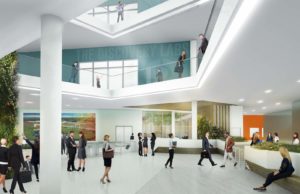
Two years after GlaxoSmithKline (GSK) consolidated global R&D operations in part by selling its Upper Merion West research and development campus in suburban Philadelphia, the buyer is transforming the site and an adjacent property into a $1.2 billion campus focused on cell and gene therapy development, drawing users that range from academic institutions, to corporate giants, to startups.
Earlier this year, The Discovery Labs partnered with healthcare investment management firm Deerfield Management Co. to create what they say will be the world’s largest cell and gene therapy contract development and manufacturing organization (CDMO). The Center for Breakthrough Medicines offers preclinical through commercial manufacturing of cell and gene therapies and component raw materials, with capabilities that include process development, plasmid DNA, viral vectors, cell banking, cell processing, and support testing.
Work has begun toward constructing of a total 86 suites for plasmid manufacturing, viral vector production, universal cell processing, CGMP testing, process development, and cell banking—as well as on reserving capacity for the new facilities now for use starting later this year. The Discovery Labs said its viral vector and cell processing suites will fully comply with both FDA and European Medicines Agency standards, with flexibility to meet client-specific workflows and meet growth in demand.
“It’s very helpful to have a one-stop shop in that you have not just your raw materials and your critical components on site, but also your end-to-end solution, and you’re able to both insource and outsource manufacturing on our site as well, in the form of either using our CDMO or leasing space on our site with our expansion capacity,” Audrey Greenberg, Board Member and Executive Managing Director for The Discovery Labs told GEN Edge. “We could probably build up to 4 million square feet.”
The Center has signed a long-term lease for 40% of the space (680,000 square feet) at The Discovery Labs King of Prussia. The 1.6 million-square-foot campus is a 280-acre property that combines the 1 million-square-foot former GSK campus in Upper Merion Township, PA, with the adjacent Innovation Renaissance campus.
GSK moved out R&D operations from the campus, dubbed Upper Merion West in 2018, though the pharma giant leased back 87,000 square feet there and retains a separate manufacturing site in Upper Merion that completed a $120 million expansion last year. GSK said the expansion at Upper Merion East was intended to accelerate its development of next-generation biologics. GSK sold Upper Merion West to MLP Ventures, a private venture capital, private equity and real estate investment company that formed The Discovery Labs.
“Cell processing for the world”
“There’s a tremendous need for lab space, and there’s a global shortage of manufacturing space. Given our proximity to an international airport and being on the East Coast, we really can manufacture viral vectors, plasmids, and do cell processing for the world,” Greenberg said.
Beyond meeting their manufacturing needs, The Discovery Labs also aims to enable early-stage cell and gene therapy companies to grow within the campus. A biotech incubator, Unite IQ, allows startups to access the Center, and is managed by the Pennsylvania Biotechnology Center (PABC), the operators of an early stage life sciences venture fund, Hatch Biofund Management.

Through another entity called THE COLONY, The Discovery Labs supports cell and gene therapy startups by offering them custom-built “discovery” labs, breakthrough funding, sponsored research agreements, as well as housing and relocation for professionals. THE COLONY will also partner with the institutions where its scientists work by offering them equity, license fees, and revenue sharing, further positioning the CDMO as a single source for new cell and gene therapy treatments from the proverbial bench to bedside.
“We are uniquely positioned, not just within Philadelphia and the greater Philadelphia area, but also from a global perspective,” she added. “A lot of the customers and tenants that we’ve seen coming through our space are looking at us and our location versus locations abroad. So, we are uniquely positioned to cater to the international community.”
Greenberg said the CDMO expects to hire over 2,000 team members within the next two and a half years, and has retained Nucleus Careers, a cloud-based specialty life sciences human capital recruiting and retention management expert, to buildout the entire team.
The CDMO and the rest of The Discovery Labs site aim to draw upon Greater Philadelphia’s life sciences cluster—ranked No. 6 by GEN last year among Top 10 U.S. Biopharma Clusters thanks to cell and gene therapy-focused anchors such as the University of Pennsylvania, Children’s Hospital of Philadelphia (CHOP), and biotechs such as CHOP spinout Spark Therapeutics, acquired by Roche for $4.8 billion in a deal completed in December 2019.
Making gene therapy history
The region first secured its place in gene therapy history in 1959 with the discovery of the Philadelphia chromosome, the abnormality of chromosome 22 found in bone marrow cells often seen in chronic myelogenous leukemia and sometimes in acute lymphocytic leukemia.
Four decades later, 18-year-old Jesse Gelsinger died in a clinical trial of a gene therapy for ornithine transcarbamylase deficiency led at Penn by pioneer researcher James M. Wilson, MD, PhD, a tragedy that set back clinical and commercial development of such treatments until recent years. Over the past decade, the region has welcomed cell and gene therapy companies that include Adaptimmune, WuXi PharmaTech, and the Global Research and Gene Therapy Center of Excellence of Cranbury, NJ-based Amicus Therapeutics.
Unlike in other regions where biopharma and life-sci activity is concentrated in urban areas—such as Boston/Cambridge, MA, and New York City—Greater Philadelphia’s cluster extends well into Philly’s suburbs, which Greenberg said is expected to benefit The Discovery Labs.
“It’s interesting that a lot of the demand for our space, not just on the startup side, but on the experienced professional side, is coming from the suburbs,” Greenberg observed. “It’s different than most urban locations given that a lot of the demand and a lot of the people actually live in the suburbs and prefer to work in the suburbs, in particular the PhDs and the life science community, because they’re older. They’re in their late 30s or early 40s by the time they complete their PhD and then get some work experience under their belt.”
The Discovery Labs envisions its suburban Philadelphia campus as the first of a network of sites worldwide: “Once we hit 50% of the way there to stabilization, we plan to look for a location on the West Coast, either in northern or southern California Asia Pacific and then Europe.”


